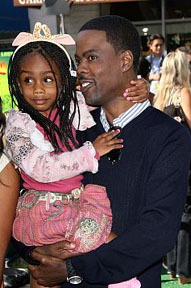 The wisecracks in Good Hair, Chris Rock’s new documentary about the multi-million-dollar industry and culture of straightening the follicles of black America, aren’t the headliners this time out. The 44-year-old actor-comedian looks in and takes a step back, letting such figureheads as Rev. Al Sharpton, rapper-actor Ice-T, actress Nia Long, poet-playwright Dr. Maya Angelou and average Americans in and out of the salons of the U.S. garner their own laughs in a sidelong look at their self-invented, processed beauty scale.
The wisecracks in Good Hair, Chris Rock’s new documentary about the multi-million-dollar industry and culture of straightening the follicles of black America, aren’t the headliners this time out. The 44-year-old actor-comedian looks in and takes a step back, letting such figureheads as Rev. Al Sharpton, rapper-actor Ice-T, actress Nia Long, poet-playwright Dr. Maya Angelou and average Americans in and out of the salons of the U.S. garner their own laughs in a sidelong look at their self-invented, processed beauty scale.
Not that Rock doesn’t get his digs in.
“Counterpunch,” he observes during a quiet chat in a living room in downtown Toronto’s upscale Yorkville district. “Get a little in there. They’re the movie. I’m not the movie.”
The movie – making its premiere at the Toronto International Film Festival before openings in the U.S. and Canada in early- to mid-October – got started when Lola, one of his two young daughters, turned to him and asked him one day why she doesn’t have good hair.
“It’s just something that people got points for,” he says of the term. “I’ve been hearing it my whole life. I mean, I don’t hear it as much today, but I remember growing up: ‘So-and-so has got good hair.’ All it meant is that they were mixed.”
Rock had been flirting with Good Hair since 1991, even trying to sell Spike TV and comedian Dave LaChapelle on the idea. But he wasn’t as famous back then. He didn’t have as much pull, and times were different. “This was before reality TV,” he observes. “’What? A doc that’s funny?’ Michael Moore wasn’t that big, and there was no Borat. You know what I mean? There was no precedent for me. And it’s, like, the blackest topic ever. So, it just seemed an impossibility to get the movie made at that time. I literally forgot. I literally was, like, ‘Whatever.’ And then my daughter saying that kind of sparked it, like: ‘You know what? I want to do this.’”
The whole culture is an open secret, an immensely profitable and just as bizarre secret, as people willingly put burning ooze on their heads – a concoction popularly known as Creamy Crack – to straighten their hair. The stuff is so corrosive that it can disintegrate aluminum soda cans.
One of the centerpieces of the documentary is a visit to a massive black hair show in Atlanta, perhaps the biggest convention in a city that is chock full of them. At two consecutive annual shows, he tracks the progress of four stylists who take centre-stage in a glittering styling show that has as much pomp and drama as professional boxing.
Frankie is a stylist whose bizarre concepts range from a cowboy theme called “Broke Front Mountain” to a Houdiniesque underwater hair-cutting routine. Kirk puts his faith in God to make him a champion. Derek is a preening showboat who, after being disqualified from the competition one year, tries to find a way around the rules. Jason is the white guy in the mix, a surfer-dude type who gets Botox injections before hitting the stage.
“The religious guy, what’s his name?” Rock asks, searching. “Kirk! Kirk actually won this year. Kirk came back without the girl and actually won this year. Derek – I saw Derek in Atlanta. He’s on Real Housewives of Atlanta now. I don’t know exactly what he does. And Jason still has his shop, from what I could tell. It’s weird now, because these people are like – it’s like I did a movie with them. My relationship with them is no different than my relationship with Anthony Hopkins, or someone I did a movie with. ‘Morgan Freeman! Hey, we did a movie! What’s up, man?’”
The celebrities all over the film and the real people are remarkably self-deprecating in their depictions of their own place in the culture. Sharpton is, as always, both pointed and comical, noting that black America finally got to where it needed to be – and now feels free to be whatever it wants to be. “Is it trying to look European?” Rock asks, considering Sharpton’s comments. “But the act of trying to look European is a black act? I guess, technically it is. Because a European wouldn’t try to look European.”
Rock travels to India, where women have their long heads of hair shaved as religious rite. That hair is then taken from the temple, sent to America and sold for the hair weaves that black women pay thousands of dollars for. And it’s not just celebrities: Good Hair shows average Americans who skimp on the rent and grocery bill so they can acquire and maintain a weave.
Angelou, 81, is one of the funniest prominent people in the movie. She got her first process at age 70, Rock is astounded that she went her whole life without one. “Not my whole life,” she corrects, smiling. “I’m still alive.”
Good Hair doesn’t shy away from the widespread social implications of the culture, including sex. As many women in the documentary explain how they don’t want their weaves touched during moments of intimacy – Ice-T lays out the implications of committing such a transgression, and one guy in a barber shop hinges that on his preference for white women to howling debate with everyone else in the shop – a few women at the festival press and industry screening of Good Hair walked out. Now, it could have been that they had to rush off to see another film. Or…
“They’re born again,” Rock says, straight-faced, then laughing just a little. “Always happens at any movie. Whenever you’re testing a movie – I don’t care what you test; if you test a movie that’s not rated G – there’s always gonna be two or three people who are born again, and they will fill out ‘zero’ on the card. Any movie you go.”
Lola is seven now, but Rock says she hasn’t got a taste for the Creamy Crack yet. “No, no,” he says. “She doesn’t even know it exists.” There will, however, come a time.
“The day will come,” he admits. “She’ll be in her teens, or whatever. Whatever she wants to do. Who knows what she’ll do? Who knows what Creamy Crack will be by then, too. Technology is amazing. You know what I mean? Hey, Freddie Mercury says he’s got AIDS; he’s dead the next day. Magic Johnson’s, like, on his 20-year AIDS anniversary. Who knows what they’ll have by the time she’s of age?”
~ Seán Francis Condon
Tags:
Chris Rock, Good Hair, tiff, tiff 2009







Comments: